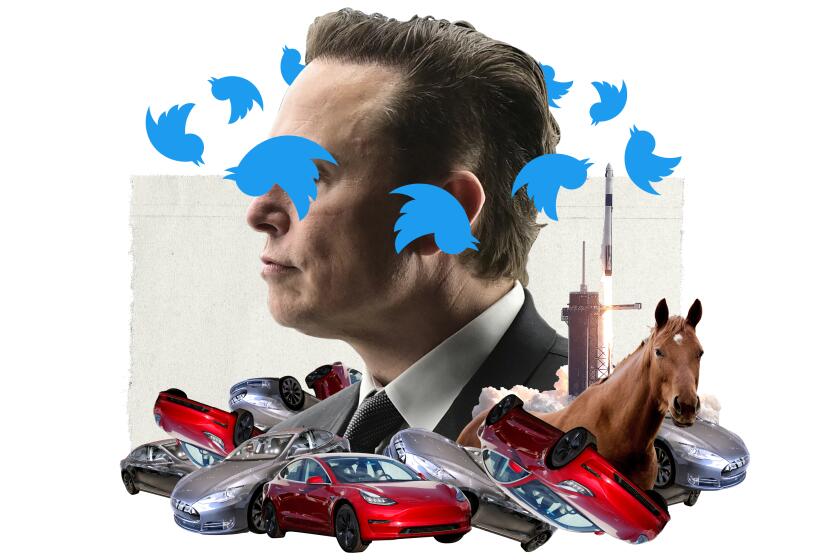Elon Musk’s X illegally fired worker over protest tweet, U.S. labor board alleges

- Share via
Elon Musk’s X Corp. illegally fired an employee in retaliation for her internet posts challenging its return-to-office policy, the U.S. labor board alleged in its first formal complaint against the company.
In a Friday filing, a regional director of the National Labor Relations Board accused the company — formerly known as Twitter — of violating the federal law that prohibits punishing employees for communicating and organizing with others about their working conditions. The complaint, issued on behalf of the agency’s general counsel, said the company “has been interfering with, restraining and coercing employees in the exercise of rights granted” under U.S. labor law.
The incident stemmed from X owner Musk ordering workers back to the office in November, after he bought the social media company for $44 billion. He reportedly told employees, “If you can physically make it to an office and you don’t show up, resignation accepted.” Employee Yao Yue responded by posting a tweet telling fellow workers, “Don’t resign, let him fire you,” and sent a similar message on an internal Slack channel. The company terminated Yue a few days later — both in retaliation for the move and to discourage other workers from engaging in collective action — according to the complaint.
“By firing her in response to trying to help her co-workers, Twitter violated federal labor law,” the employee’s attorney, Shannon Liss-Riordan, said in an interview.
A spokesperson for San Francisco-based X didn’t immediately respond to a request for comment.
Elon Musk’s track record as a boss is an endless scroll of impulse firings, retribution, tone-deafness on race — and the impregnation of a subordinate.
Complaints issued by NLRB regional directors are considered by agency judges, whose rulings can be appealed to labor board members in Washington, and from there to federal court. The agency can order policies changed and workers reinstated, but it lacks authority to fine companies with punitive damages or hold executives personally liable for violations.
While Musk has declared himself a “free speech absolutist,” his companies have repeatedly been accused by the government of interfering with employees’ rights to speak. His aerospace company, SpaceX, recently settled a claim by NLRB prosecutors that it illegally tried to stifle an employee’s speech. Earlier this year, X settled with a former employee who NLRB prosecutors had concluded was illegally punished for protesting its return-to-office mandate. (No formal complaint was issued in that case, because of the settlement.)
In March, Musk’s automaker, Tesla, lost its appeals court challenge to an NLRB ruling saying the company illegally fired an employee because of his union activism. The ruling also found that a tweet from Musk constituted an illegal threat. A larger panel of judges on the U.S. 5th Circuit Court of Appeals has agreed to hear that case, in which the company argues that the 1st Amendment protects Musk’s tweet.
More to Read
Inside the business of entertainment
The Wide Shot brings you news, analysis and insights on everything from streaming wars to production — and what it all means for the future.
You may occasionally receive promotional content from the Los Angeles Times.











